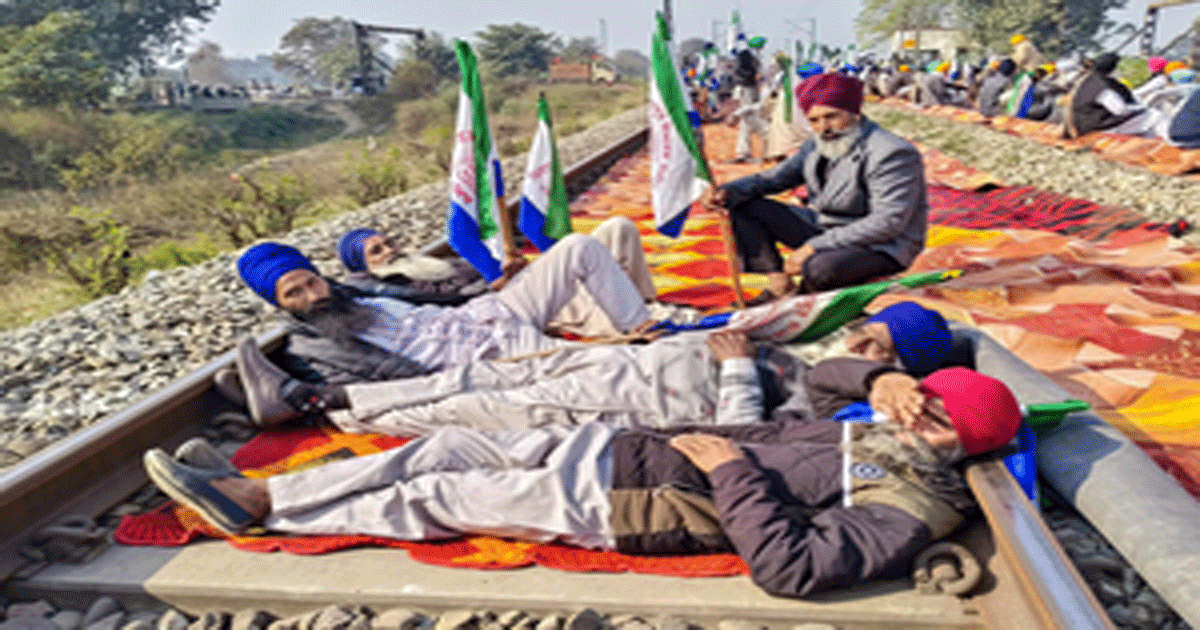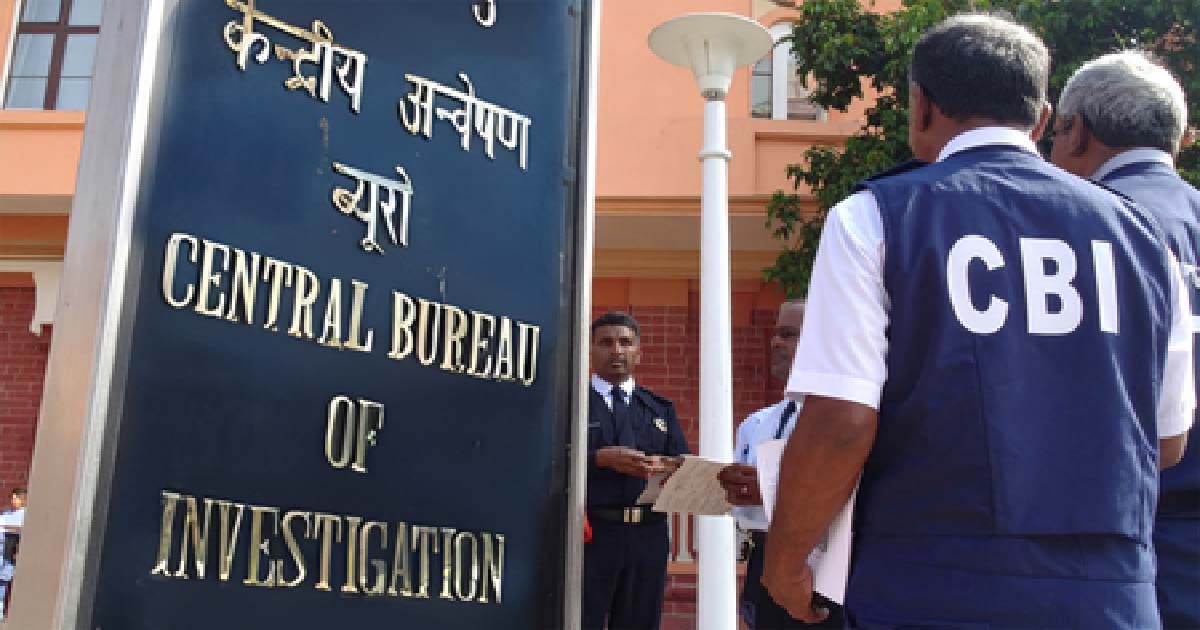National News
Commuters inconvenienced with ‘rail roko’ protest by farmers in Punjab

Chandigarh, Dec 18: Railway commuters faced inconvenience in Punjab on Wednesday after farmers squatted on rail tracks in support of their long-pending demands, including the legal guarantee of the minimum support price (MSP) for crops.
However, no untoward incident was reported in the state. The protest, at the call of the Samyukta Kisan Morcha (Non-Political) and Kisan Mazdoor Morcha, was carried out at over 100 locations in the state, badly impacting the railway services.
Kisan Mazdoor Morcha leader Sarwan Singh Pandher claimed that the three-hour “rail roko” call got a good response in the state.
The impact of the protest was more viable in Moga, Faridkot, Ferozepur, Amritsar, Tarn Taran, Batala, Qadian, Phillaur, Tanda, Dasuya, Hoshiarpur, Ludhiana and Sunam towns.
Farmers of both outfits have been camping at Shambhu and Khanauri border points between Punjab and Haryana since February 13 after their march to Delhi was stopped by security forces.
While hearing a petition, the Supreme Court on Wednesday said the court’s doors were “always open” to the demands and suggestions of protesting farmers, after they refused to engage with the Punjab government-formed committee.
The Punjab government told the apex court that despite several meetings with fasting farmer leader Jagjit Singh Dallewal, the farmers had rejected interactions with the state’s high-powered committee.
Protesting farmers, whose bid to enter Haryana in support of their long-pending demands was foiled thrice, halted the trains to lodge their protest and press their demands.
The 70-year-old cancer patient Dallewal has been fasting at Khanauri, the border point between Punjab and Haryana, since November 26 in support of their demands that included loan waiver and reforms to improve conditions in the agricultural sector.
Crime
CBI court sentences former oriental insurance manager to 3-year jail in bribery case

New Delhi, Nov 29: A special CBI court in Ahmedabad on Saturday sentenced former Senior Divisional Manager of Oriental Insurance Company Limited, Rajkot, Mahendra A. Loonker, to three years of rigorous imprisonment in a 13-year-old bribery case.
The court also imposed a fine of Rs 1 lakh on the former official.
According to the CBI press note, the case was registered on July 11, 2012, following a complaint by a partner of a private firm.
Loonker, then serving as Senior Divisional Manager at the insurance company’s Rajkot office, had allegedly demanded a bribe of Rs 15,000 to clear an accident insurance claim submitted by the complainant for an injured employee.
“CBI registered the instant case on July 11, 2012 against the accused person on allegations that accused Mahendra A Loonker, the then Sr. DM, Oriental Insurance Co. Ltd., Rajkot had demanded and accepted an illegal gratification of Rs 15,000 from the complainant, Partner of a private company in order to pass the Accident Insurance Claim filed by him regarding the accident and injury of his employee,” the CBI said.
CBI officials arrested Loonker the same day the FIR was filed, after he was found to have accepted the bribe.
Subsequent searches were carried out at his residence and office premises in Rajkot. Investigators later filed a chargesheet on December 3, 2012, against the accused for demanding and accepting illegal gratification and criminal misconduct committed by the accused public servant.
After examining the evidence and hearing arguments from both sides, the court held Loonker guilty and convicted him accordingly.
Meanwhile, the CBI Court in Vijayawada on Friday sentenced a former Railway official to one year of imprisonment in a nearly two-decade-old bribery case.
The court convicted Matta Dharma Rao, who was serving as Assistant Divisional Engineer with South Central Railway in Bhimavaram, West Godavari district, for demanding and accepting illegal gratification from a contractor.
Crime
No firearms used in Bihar Deputy CM Sinha’s victory procession, clarify police

Patna, Nov 29: A day after a purported video showed supporters using guns to fire in the air during the victory march of Bihar Deputy Chief Minister Vijay Kumar Sinha in Lakhisarai, Superintendent of Police Ajay Kumar on Saturday clarified that “firecracker guns, not firearms” were used in the celebratory firing.
Vijay Kumar Sinha, who has been elected from Lakhisarai for the fifth time, was welcomed by supporters in a grand procession.
The video circulating on social media alleged that supporters used firearms, triggering sharp criticism. However, the police investigation found the claims to be misleading.
According to SP Ajay Kumar, the device seen in the video was seized and examined by an armourer.
The probe confirmed that it was not a real rifle but a firecracker gun, a device commonly used for fireworks, bird-scaring, and to chase away nilgai and boars that damage crops in the region.
“It poses no threat to life or property,” the SP said.
Locals said that such devices are traditionally used in weddings, festivals, and celebrations involving the fulfilment of vows. After verifying their statements, police released the two youths seen handling the device in the video.
The Superintendent of Police urged the public to verify the authenticity of any video or claim before sharing it online, cautioning against the spread of misinformation.
He reiterated that the firing involved only a firecracker containing gunpowder, not a live bullet.
Following the viral video, RJD leaders were quick to target the Deputy Chief Minister.
From the party’s official X handle, RJD posted, “Fire the bullet, show the double-barrelled gun, intimidate the public – the government of loud speeches has arrived. Now for five years, keep listening to sermons based on stories from 25–30 years ago, because this government is capable of nothing more than this.”
RJD spokesperson Ejaz Ahmed also criticised the administration, saying, “The gunfire that greeted Deputy Chief Minister Vijay Sinha shows the true state of affairs in Bihar. While the Home Minister talks about expelling crime and criminals, the government must clarify what action will be taken against those who created fear among the public with such firing.”
Mumbai Press Exclusive News
Jogeshwari POCSO case: Accused out on bail arrested again

Mumbai: A fugitive accused involved in the Mumbai Pisco case has been arrested again by the Jogeshwari police after 6 years. In Jogeshwari, Mumbai, accused Pankaj Panchal, 27, was arrested in 2019 in the Pisco child abuse and exploitation case and was on bail but was absent from court proceedings and had been hiding his identity for the last 6 years. The police received information that the accused had come near the SRA building, on which the police laid a trap and succeeded in arresting the accused from Jogeshwari. The court had also issued a non-bailable warrant against him, after which the police complied with it and arrested him and presented him in the court and the court has sent him on remand. The police are investigating further. This information has been given by DCP Datta Nalawade of Mumbai Police Zone 10.
-

 Crime3 years ago
Crime3 years agoClass 10 student jumps to death in Jaipur
-

 Maharashtra1 year ago
Maharashtra1 year agoMumbai Local Train Update: Central Railway’s New Timetable Comes Into Effect; Check Full List Of Revised Timings & Stations
-

 Maharashtra1 year ago
Maharashtra1 year agoMumbai To Go Toll-Free Tonight! Maharashtra Govt Announces Complete Toll Waiver For Light Motor Vehicles At All 5 Entry Points Of City
-

 Maharashtra1 year ago
Maharashtra1 year agoFalse photo of Imtiaz Jaleel’s rally, exposing the fooling conspiracy
-

 National News1 year ago
National News1 year agoMinistry of Railways rolls out Special Drive 4.0 with focus on digitisation, cleanliness, inclusiveness and grievance redressal
-

 Maharashtra1 year ago
Maharashtra1 year agoMaharashtra Elections 2024: Mumbai Metro & BEST Services Extended Till Midnight On Voting Day
-

 National News1 year ago
National News1 year agoJ&K: 4 Jawans Killed, 28 Injured After Bus Carrying BSF Personnel For Poll Duty Falls Into Gorge In Budgam; Terrifying Visuals Surface
-

 Crime1 year ago
Crime1 year agoBaba Siddique Murder: Mumbai Police Unable To Get Lawrence Bishnoi Custody Due To Home Ministry Order, Says Report












